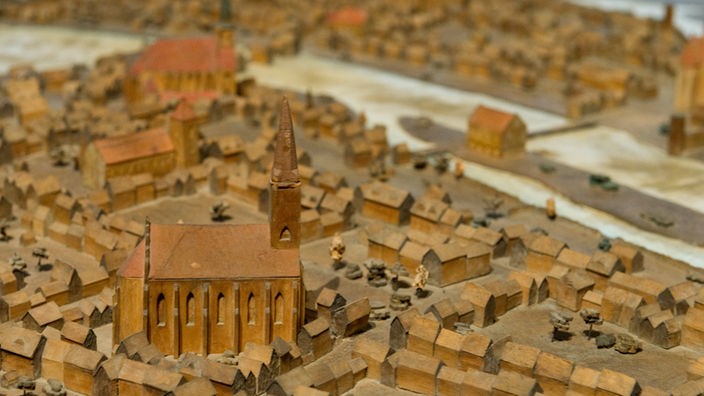 His son, Frederick II - called by historians Frederick the Great (1712-1786), and by the subjects of "Der Alte Fritz” - was popular for a short time by introducing liberal reforms, but soon he returned to the ways of his father. Prussia was drawn into a series of wars, as a result of which taxes in Berlin skyrocketed, while the king took refuge in the Sansouci Palace in Potsdam, where only French was spoken, and left the Berliners to pay the bills for his military adventurism. The mitigating circumstance was the fact, that Frederick considered himself a philosopher-king and that Berlin's cultural life flourished under his rule. This was in part the work of the leading figures of the German Enlightenment, such as the playwright Gotthold Ephraim Lessing and the philosopher Moses Mendelssohn, who enjoyed royal patronage.
His son, Frederick II - called by historians Frederick the Great (1712-1786), and by the subjects of "Der Alte Fritz” - was popular for a short time by introducing liberal reforms, but soon he returned to the ways of his father. Prussia was drawn into a series of wars, as a result of which taxes in Berlin skyrocketed, while the king took refuge in the Sansouci Palace in Potsdam, where only French was spoken, and left the Berliners to pay the bills for his military adventurism. The mitigating circumstance was the fact, that Frederick considered himself a philosopher-king and that Berlin's cultural life flourished under his rule. This was in part the work of the leading figures of the German Enlightenment, such as the playwright Gotthold Ephraim Lessing and the philosopher Moses Mendelssohn, who enjoyed royal patronage.
The rise of Prussia alerted Austria, Saxony, France and Russia, which initiated v 1756 years of the Seven Years' War. Four years later, these states occupied Berlin and demanded a ransom in the amount of 4.000.000 thalers, and the mayor of the city of Kirchstein passed out on the spot. The sum was later reduced to 1.500.000, when discovered, that the city's treasury is empty. Eventually, Frederick freed Berlin, then won the war (admittedly a forfeit), when Russia and France fell apart. The victory confirmed the importance of Prussia in Central Europe, but keeping the peace meant having a great one, standing army.
In addition to direct taxes, Fryderyk filled the treasury by introducing a state monopoly on the coffee trade, salt and tobacco. Citizens were required to purchase certain amounts of these goods, whether they needed them or not.
Many of Berlin's most famous culinary specialties come from here: sauerkraut, Kassel Ribs (salted pork ribs) and gherkins were invented to get rid of salt stores. Discontent among the population was covered up by the secret police and press censorship - these two inventions of Frederick in one form or another have survived to this day.
The avenue Unter den Linden acquired all its splendor during the reign of Frederick, for such wonderfully new buildings as the Altes Bibliothek were erected there. Right next to the great boulevard, Franzosisches Dom was erected for the needs of the Hughon people, while the construction of Schloss Bellevue in Tiergarten triggered a building boom, because wealthy Berliners used to stay in this trendy district since then.
FALL AND OCCUPATION
After Fryderyk's death in Prussia, there was a period of decline, ended with the defeat of the once invincible army at the Battle of Valmy in 1792 years against the French revolutionaries. The fall continued during the reign of Frederick William II (1744-1797) and in the Napoleonic era. Bonaparte's empire grew, but the Prussian court delayed decisive action, attempting to appease the French and delay the inevitable invasion. Life in Berlin went on a more or less normal course, but in August 1806 In the year, residents watched the troops march west, to meet Napoleon's troops. 19 September the king and queen left the city, and a month later, Count von der Schulenburg followed in their footsteps. city governor, which until the defeats at Jena and Auerstadt provided the Berliners. that everything is going well.
Five days later, French troops marched to the Brandenburg Gate and the occupation of Berlin began. 27 October 1806 Napoleon himself arrived and headed the parade along Unten den Linden; according to some accounts, some Berliners saw him as a liberator. The French occupation went smoothly, not counting a failed armed uprising, and it ended with the fall of Napoleon's empire after the defeats in Russia and at the Battle of Leipzig.
The revival of prussia
After the end of the French rule, the Quadriga returned to the Brandenburg Gate, Goddess of Victory. but the people of Berlin were only promised a constitution in Prussia. which was not fulfilled and which became the source of later conflicts. The Prussian state turned out to be the real winner, which acquired the lands on the Rhine, including the Ruhr with iron and coal deposits, which made it possible to rebuild military power.
After the war, there was an era of reaction and persecution, which suffocated the intellectual and cultural life in Berlin to such an extent, that the philosopher Wilhelm von Homboldt had made a professorship at the university in protest of the new authoritarianism. This, however, gradually gave way to the Biedermeier era, when the Prussian industry developed, the foundation of Prussia's future status as a great power. Berlin continued to grow: factories were built, railways and the first from Mietskaserne, i.e. tenement houses in the city - which was an announcement of future industrialization.